I continue a series of notes about programmable logic controllers with which I can work. This time it will be again about the "Chinese controllers with Aliexpress" from the campaign Wecon.
But first you need to remind why I became interested in them. When choosing a PLC for a project, the question of price / quality ratio inevitably arises. It is good, of course, to use Siemens or Schneider controllers that have been tested by time, but this does not always allow the budget; they are very expensive.
Earlier, when we had to install cheaper controllers in the project, we chose the domestic PLC ARIES, but for many reasons we began to look for an alternative to it. Among other things, I drew attention to the inexpensive PLC of the Chinese company Wecon series LX3V / LX3VP / LX3VE. I
already wrote about the simplest and cheapest model LX3V-0806MT-A2.
Today we will talk about more advanced models: LX3VP-1616MR-A and LX3VE-1412MT-A.
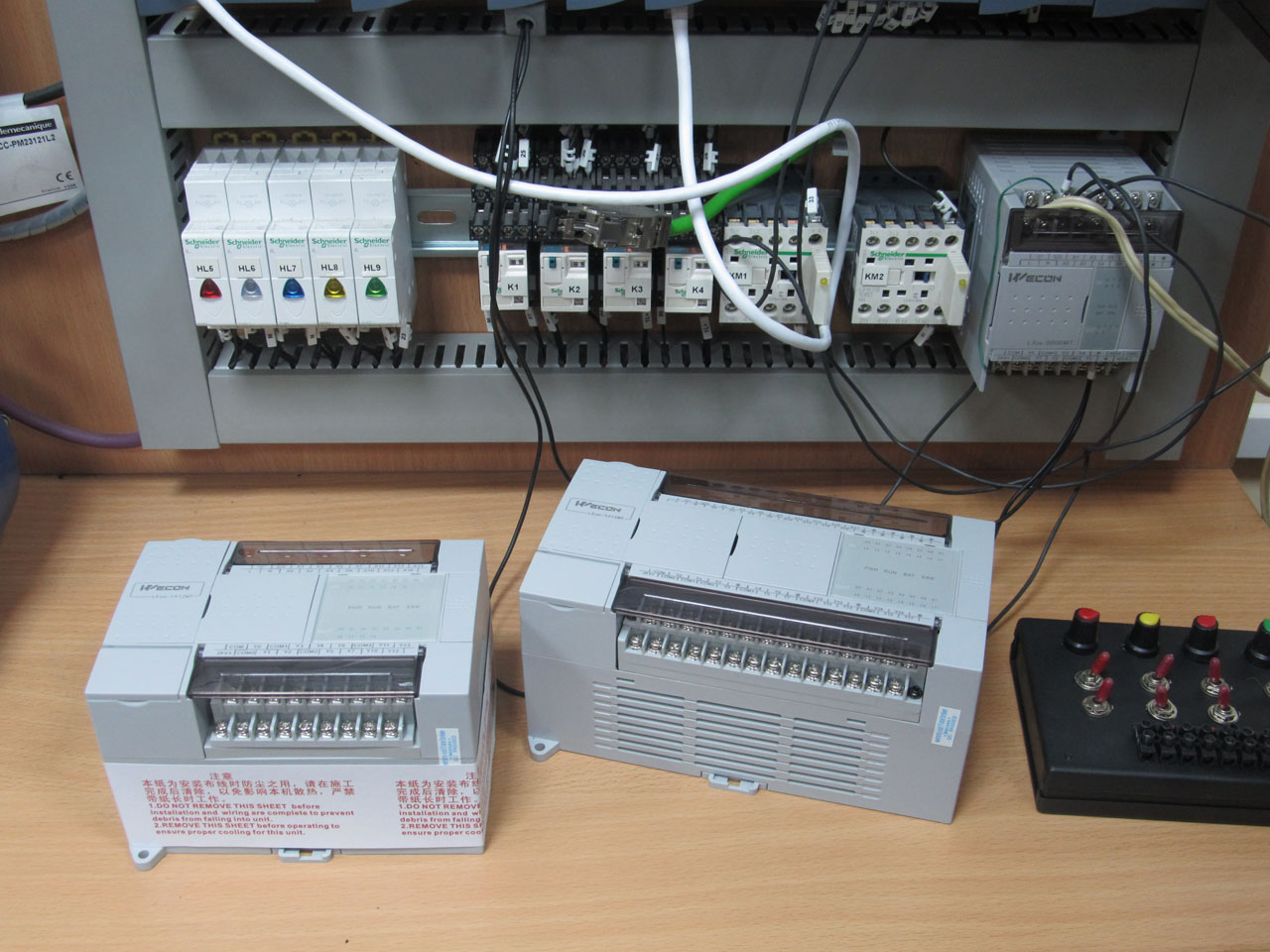
The main pros and cons of LX3VP / LX3VE
Advantages:
- Software architecture compatible with Mitsubishi FX2N. For me, this was the key when programming I wanted something clear and popular, and not to learn the next “exclusive bike”
- Programming through the free software Wecon PLC Editor
- There is a PLC simulation in the software, which allows you to debug the program without the presence of the controller itself. Eka nevidal? Meanwhile, the other Chinese Xinje PLC I worked with, with a similar software architecture, has no software simulation. And this may complicate support for developed programs.
- Download programs via a regular micro USB cable
- Up to 6 RS-485 data ports, of which up to 5 with Modbus
- Up to 2 Ethernet ports when installing a DB Board
- Ability to connect DB Board expansion boards and expansion modules. At OWEN PLC110, for example, there are no such options
- The official site has a forum, technical support and sample programs.
- Low cost, especially if you buy through Aliexpress or directly on the website Wecon
Disadvantages:
- Only 1 RS-485 port with Modbus onboard the PLC, the rest only when the DB Board is connected, that is, for an additional fee
- There is no documentation in Russian. But this disadvantage is conditional, since there is a lot of information in Russian about programming Mitsubishi FX2N PLCs with which Wecon LX3 are compatible at the command level. Therefore, we can safely study the programming of Wecon on the materials of Mitsubishi FX2N, I did just that
Specifications
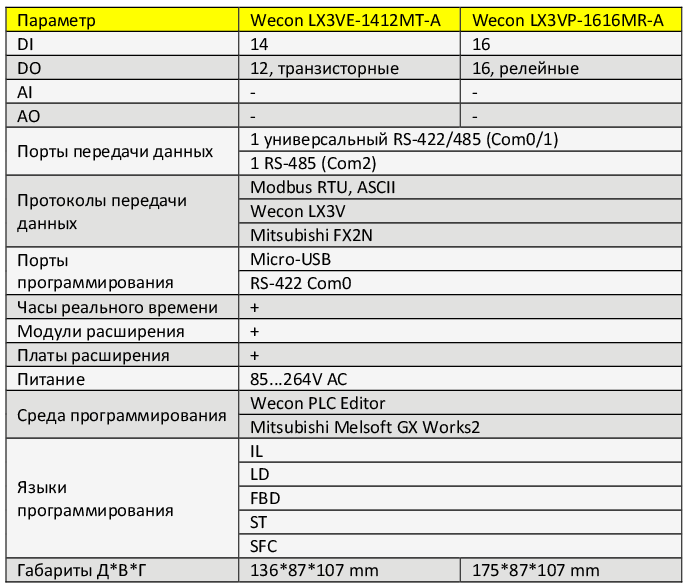
Design
Let us take a closer look at the design of the considered PLC. Photos are clickable.
WECON LX3VE-1412MT-A, front
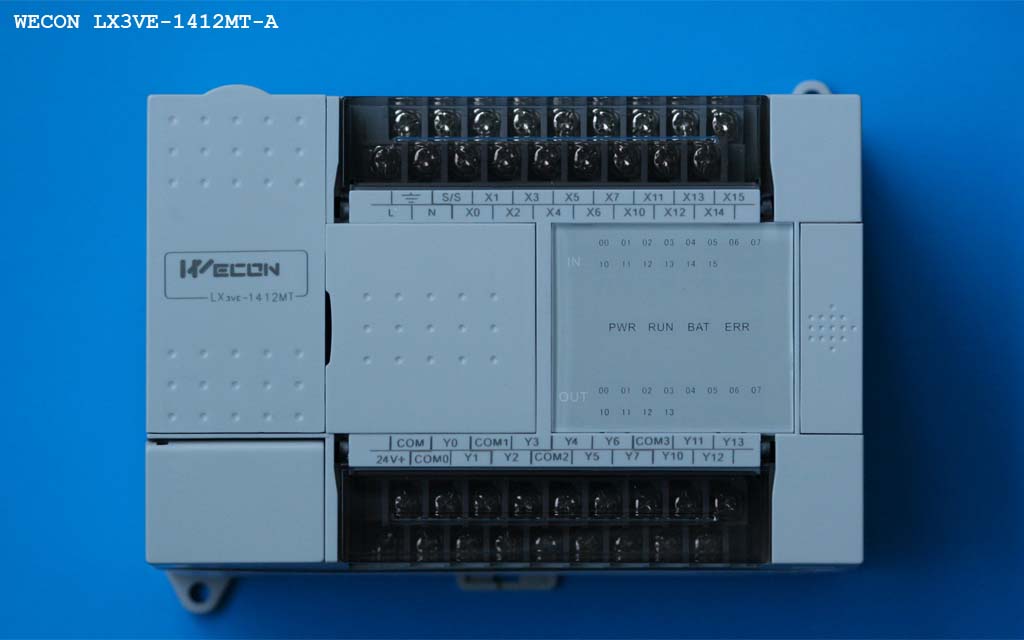
Further, I will consider the construction only of the WECON LX3VP-1616MR-A PLC, as more complex. The main difference between these models is in the type of discrete outputs. The letters "MT" in the name mean transistor outputs, "MR" means relay outputs.
WECON LX3VP-1616MR-A, in front

Front, without covers
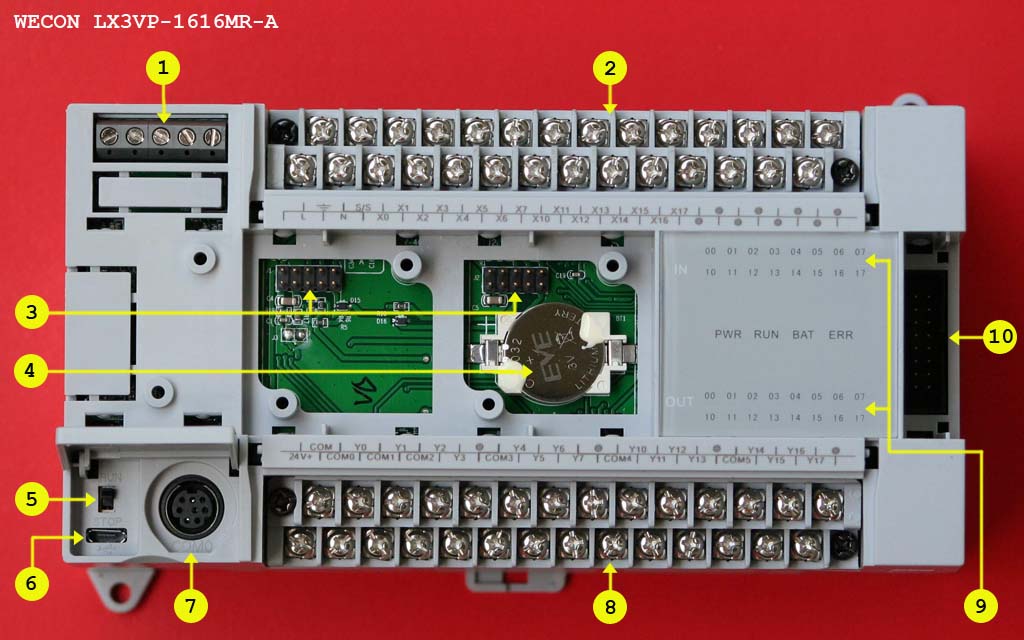
1. RS-485 ports: Com1 and Com2
2. Top terminals:
L, N: PLC power supply via AC 85 ... 264V
⏚: not used in these models
X0 ... X7, X10 ... X17: discrete inputs
S / S: common for discrete inputs
3. Connectors for the DB Board
4. CR2032 battery for RTC
5. RUN / STOP switch
6. Micro USB 2.0 TYPE B port for downloading software. It is better to download the program through it, it is much faster.
7. RS-422 Com0 port for downloading programs, Mini DIN-8 jack
8. Bottom terminals:
24V +, COM: outgoing power to the integrated 24V DC power supply
COM1 ... COM5: input terminals for relays, respectively: Y0, Y1, Y2 ... Y3, Y4 ... Y7, Y10 ... Y13, Y14 ... Y17
Y0 ... Y7, Y10 ... Y17: relay outputs
9. Status indication of discrete inputs and outputs
10. Connector for expansion modules
Above, RS-485 ports Com1 and Com2
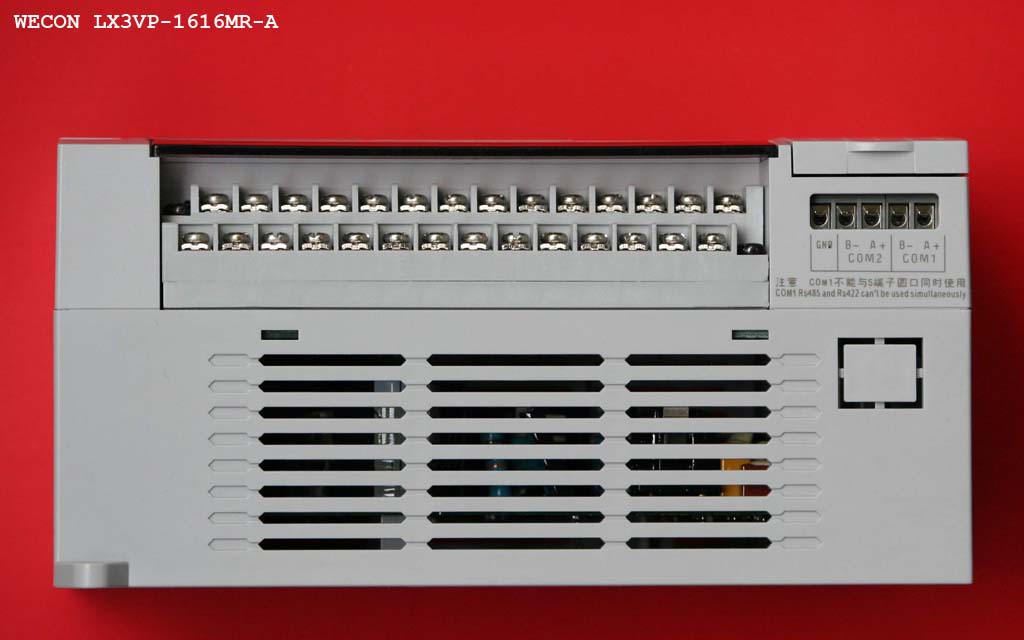
The inscription under the ports states that data transmission at the same time can work either via RS-422 Com0 or RS-485 Com1. The fact is that Com0 and Com1 are physically one universal port RS-422/485
Side, PLC label
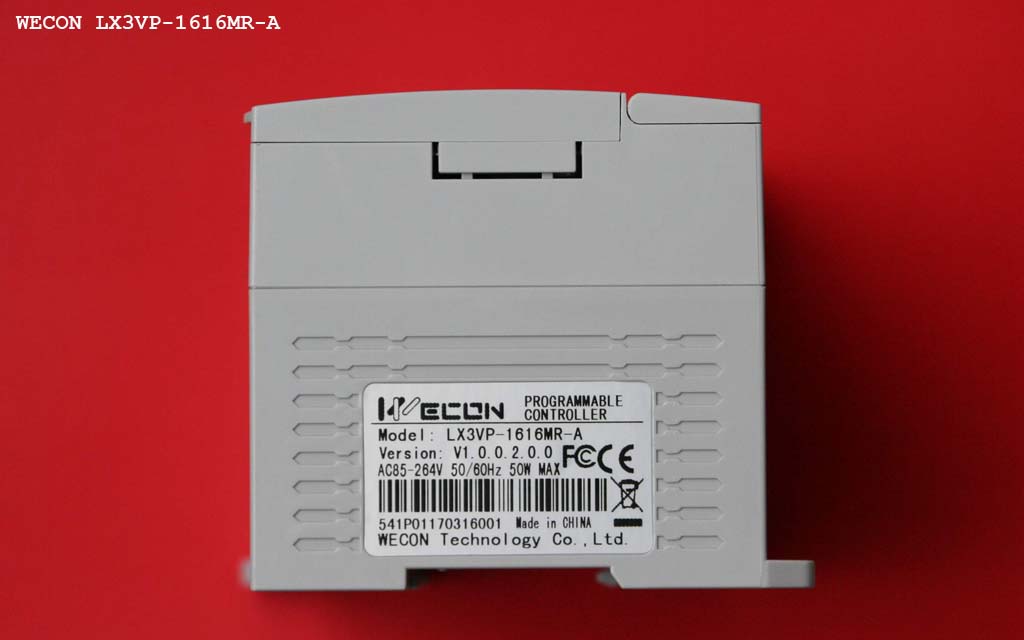
The nameplate shows the model name LX3VP-1616MR
-A , while the front panel simply says LX3VP-1616MR. The letter "A" means "power 85 ... 264V AC".
Rear DIN rail mounting
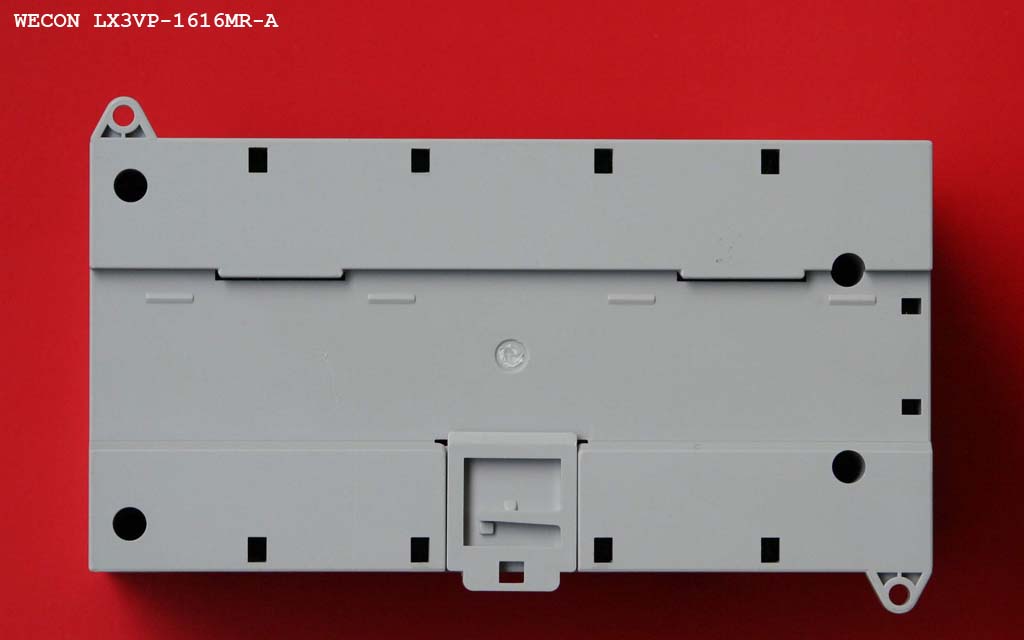
Bottom, control seal
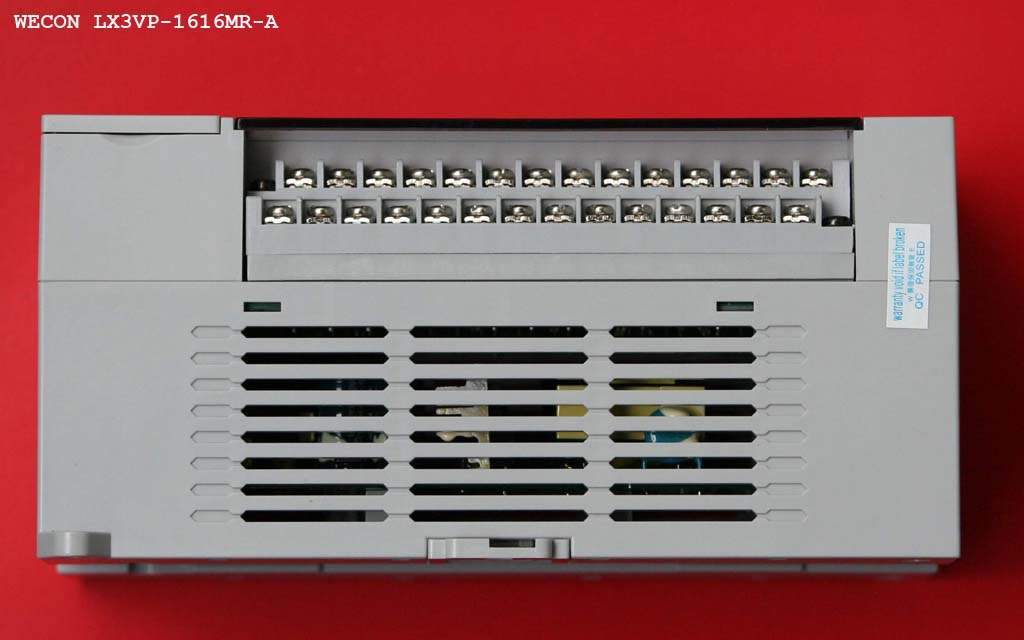
Without damaging the control seal, you cannot disassemble the PLC body and look at the boards, and the damaged seal removes the device from the warranty. But what can you do for the sake of curiosity! Break the seal and climb inside. Photos are even more clickable.
Top board
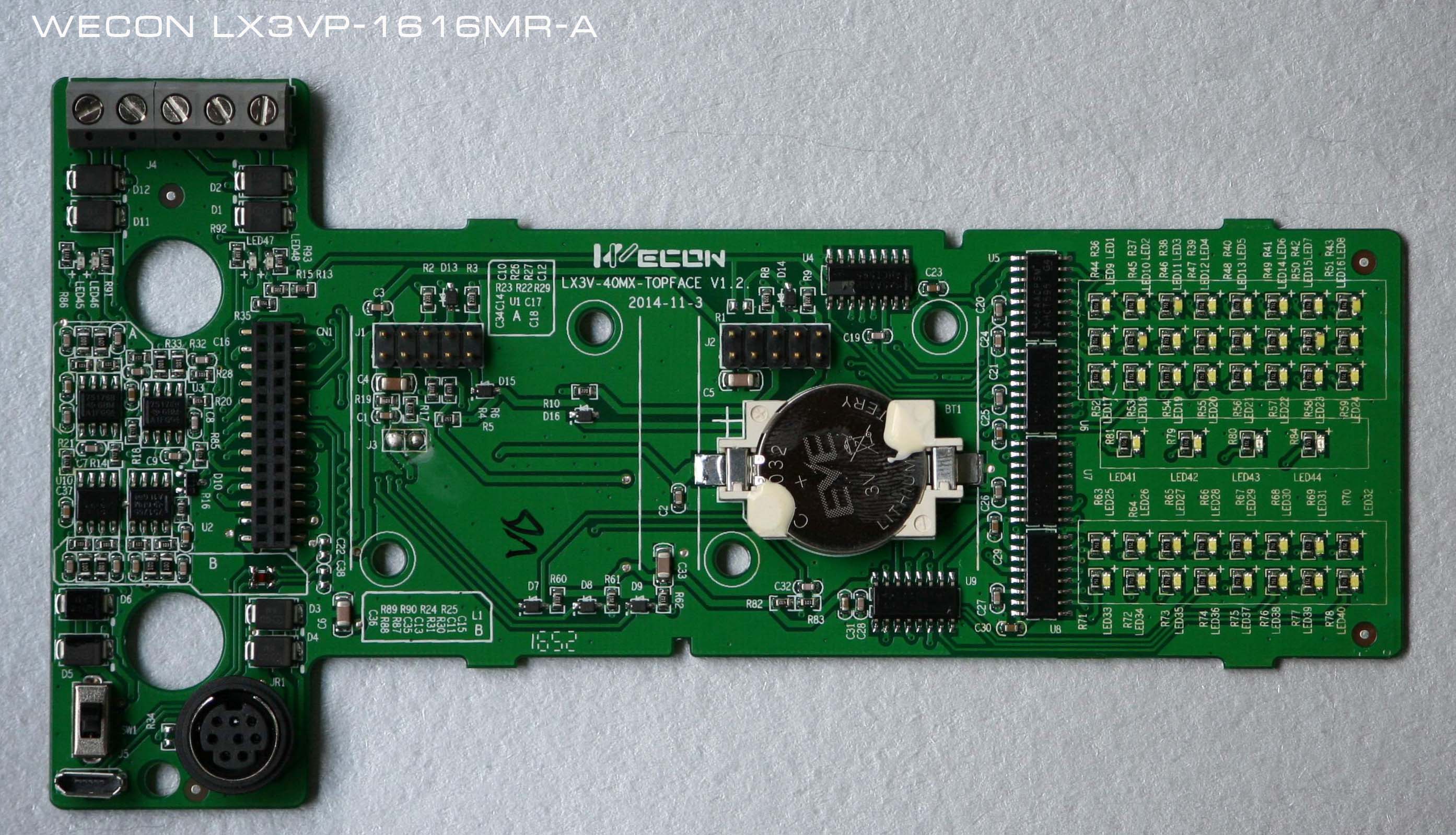
Chips are covered with a thick layer of varnish, because of this marking on many of them is not readable.

CPU board Panasonic ALDP124 relays on ~ 250V / 5A are used for discrete outputs
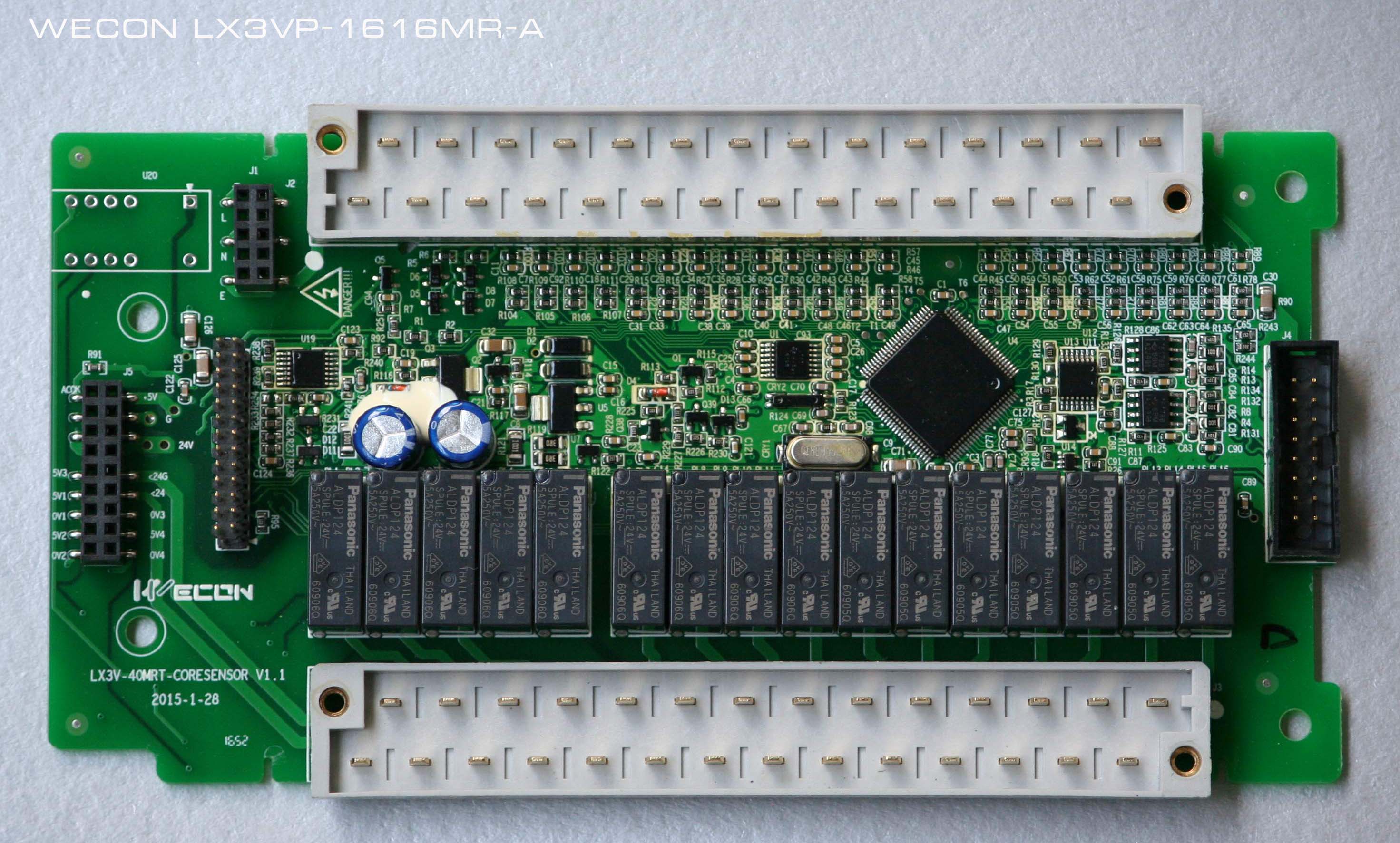
We see that the brain of the PLC is an ARM processor STM32F103VET6 with a frequency of 72 MHz
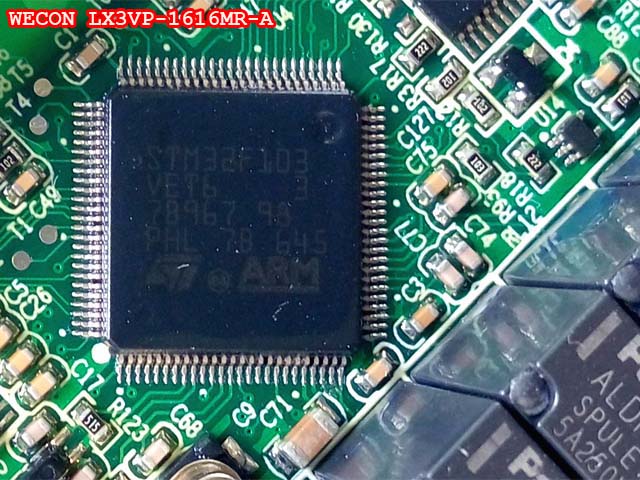

Power board
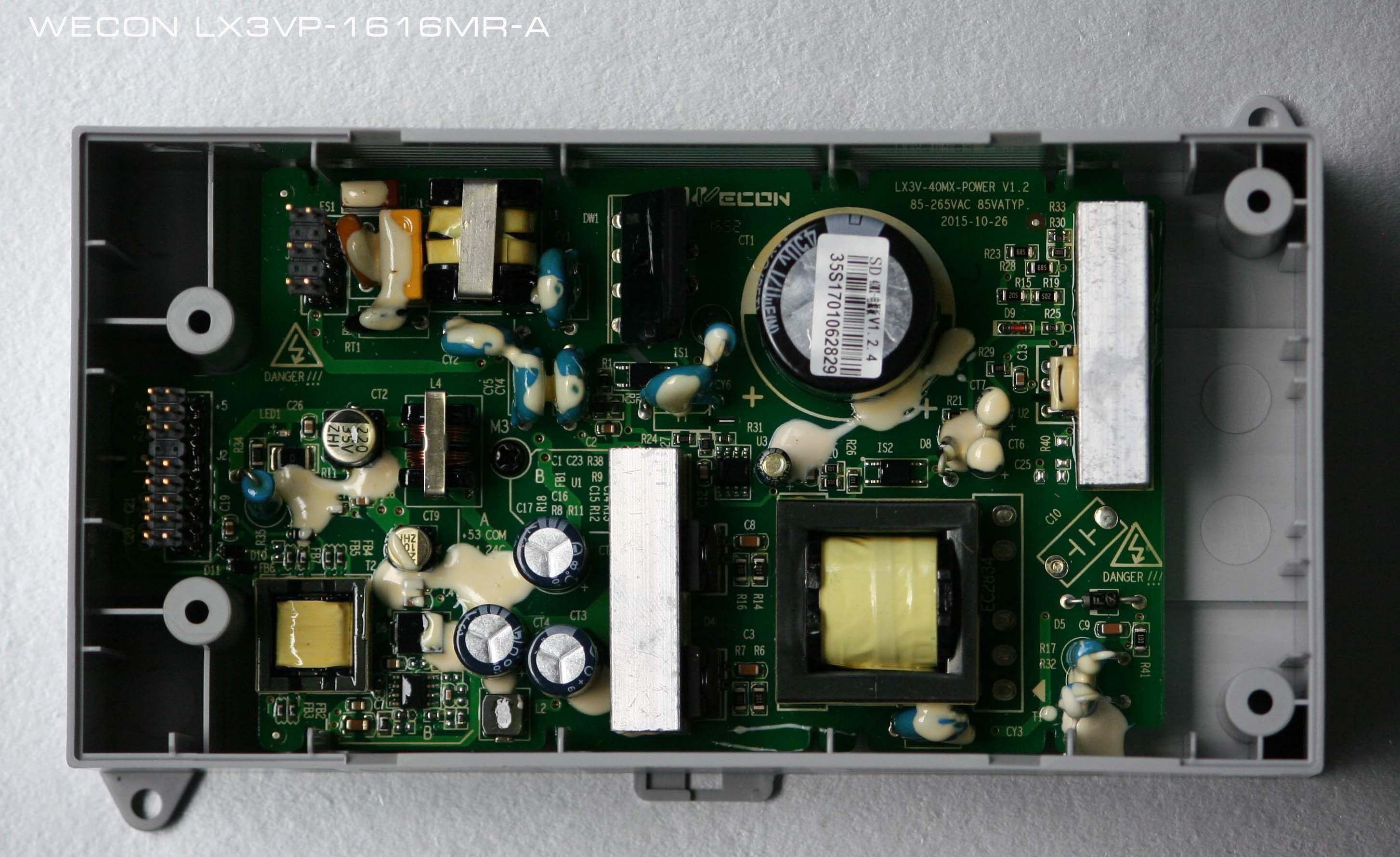
Expansion options
If the basic functionality of the LX3VP / LX3VE PLC is not enough, then it can be expanded by installing expansion modules and additional DB Board. Thus you can increase the number of inputs and outputs, including analog, and increase the number of data ports.
You can add up to 256 inputs and 256 outputs on the PLC.
Expansion modules are installed on the DIN rail to the right of the processor module and connected to it, or to the previously installed module, via a short cable. This is very similar to how it was in the Simatic S7-200, if anyone remembers those.
On some PLC models, such as the unpretentious LX3V-0806MT-A2, the ability to connect expansion modules is missing.
Analog input module LX3V-4AD for 4 AI -10 ... 10V / -20 ... 20mA / 4 ... 20mA:
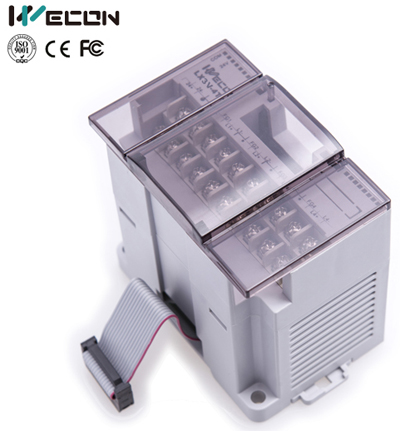
The DB Board, in contrast to the expansion modules, is installed directly on the PLC package into special seats. Depending on the PLC model, the seats for the DB Board can be 1 or 2. All LX3V PLC models have at least 1 footprint, even LX3V-0806MT-A2.
DB Board are single (short) or double (long) size. Accordingly, the seats for them are single or double size.
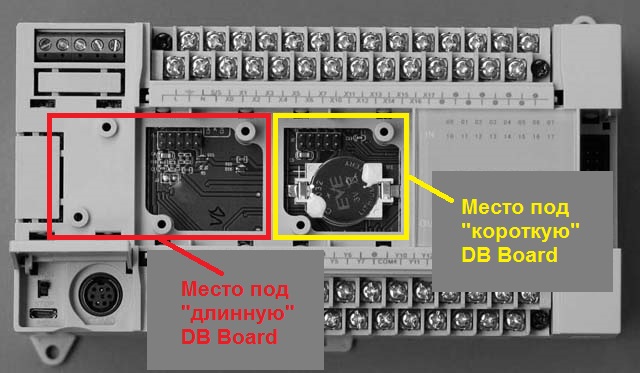
When selecting a DB Board, you need to take into account how many seats there are on the PLC and what size they are. For example, the PLC LX3V-0806MT-A2 has 1 footprint for the short DB Board.
The LX3VE-1412MT also has 1 footprint, but under the long DB Board.
The LX3VP-1616MR has 2 seats, where 1 for short and 1 for long DB Board.
Naturally, in the seat under the long board, you can install a short DB Board, but you cannot install a long DB Board in the seat under the short board.
"Short" DB Board LX3VP-ETH-BD on 1 Ethernet port:
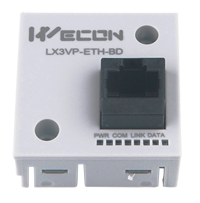
“Long” DB Board LX3V-2AD-BD for 2 AI 4 ... 20 mA:
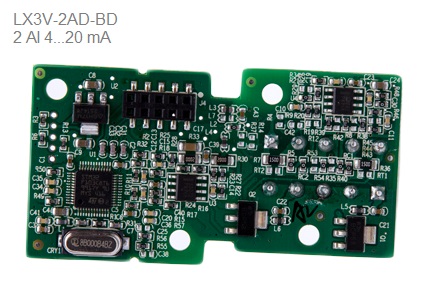
Interfaces and data transfer protocols
On board the LX3VP / LX3VE models under consideration there is only 1 RS-422 Com0 port and 2 RS-485 ports: Com1 and Com2.
At the same time, RS-422 Com0 and RS-485 Com1 are two components of the universal RS-422/485 port, so data transmission at either Com0 or Com1 can work simultaneously.
The “round” RS-422 Com0 port was originally introduced into the Wecon PLC for compatibility with Mitsubishi FX2N, where it is used to download programs. By the way, RS-422 cables for programming are also compatible. But Wecon additionally installed in its controllers a USB port for programming, which is much faster and more convenient.
Com0 / Com1 supports Wecon LX3VP / LX3VE protocol, but Modbus does not. It is possible to connect HMI to Com0 / Com1, but they must work using the Wecon LX3VP / LX3VE protocol. First of all, naturally, this is the Wecon HMI itself.
Currently HMI Samkoon and Weintek do not support Wecon protocols. But they support the Mitsubishi FX2N protocol, and since Wecon supports Com0 / Com1 and it, you can try connecting the HMI to the PLC using the Mitsubishi FX2N protocol. But here at my own risk and risk, in the HMI Samkoon software simulator I managed to get in touch with LX3VE, but the reliability and correctness of such a bundle in actual operation need to be checked.
The Wecon LX3VP / LX3VE protocol is good because the PLC program doesn’t need anything else to set up — just connect the PLC to the HMI and output the data to it.
The protocol with fixed parameters works: 9600, 7, 1, Even.
PLC and HMI operation using Wecon protocol
The RS-485 Com2 port supports Wecon LX3VP / LX3VE and Modbus protocols.
Additional RS-485 ports can be added using the DB Board LX3V-RS458-BD, on which there are 2 RS-485 Modbus ports each.
Thus, in LX3VE-1412MT-A, where 1 place is under the DB Board, you can install up to 4 RS-485, of which up to 3 with Modbus.
On the LX3VP-1616MR-A, where 2 seats under the DB Board, you can install up to 6 RS-485, of which up to 5 with Modbus.
There are no Ethernet ports in the LX3VP / LX3VE, but you can add them using the DB Board LX3VP-ETH-BD, on which there is 1 Ethernet port.
Thus, the LX3VE-1412MT-A can have 1 Ethernet port installed, and the LX3VP-1616MR-A 2 Ethernet ports.
Programming
Initially, Wecon PLCs were created as a cheap alternative and clone of the popular Mitsubishi FX2N PLCs, hence their compatibility at the command level. Therefore, Wecon can even be programmed using the Mitsubishi software Melsoft GX Works2, which has more features, including programming in languages LD, IL, FBD, ST, SFC. But downloading a program from this software is possible only via RS-422 Com0.
In the native Wecon PLCEditor software, only languages LD and IL are available. But while programming additional instructions are available that are not available in the Mitsubishi PLC.
All programming instructions LX3VP
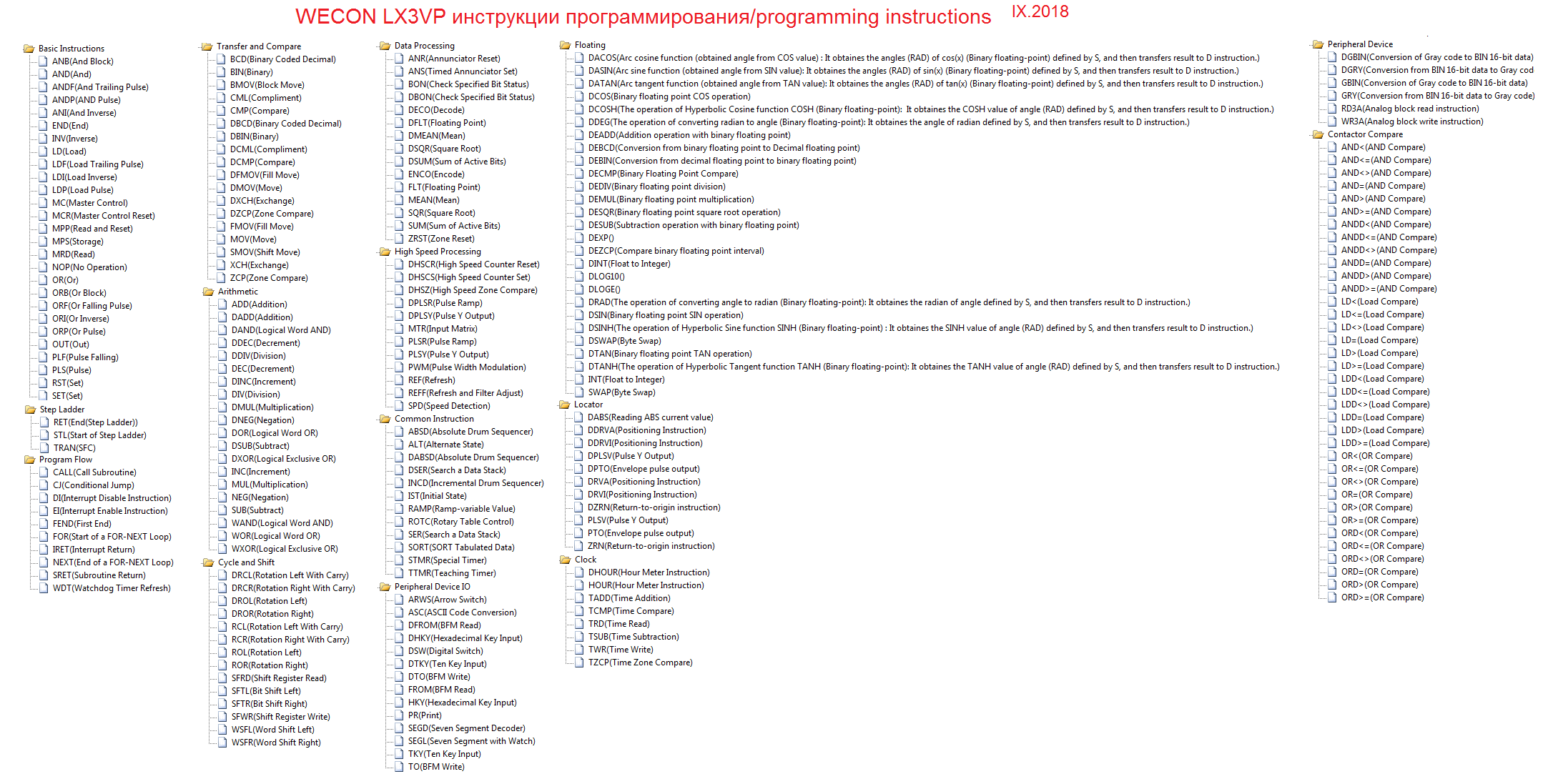
The program does not have the ability to create functional blocks FB, you can use only subroutines.
Subroutine usage example
Over 2 years of use, the Wecon PLC has worked well.
Links
→
Wecon PLC on the official website→
Wecon PLC on AliExpress→
An article on Habré about the simplest Wecon PLC→
Learn more about programming Wecon PLCs.→
Example of Wecon PLC operation with expansion module→
Forum Wecon